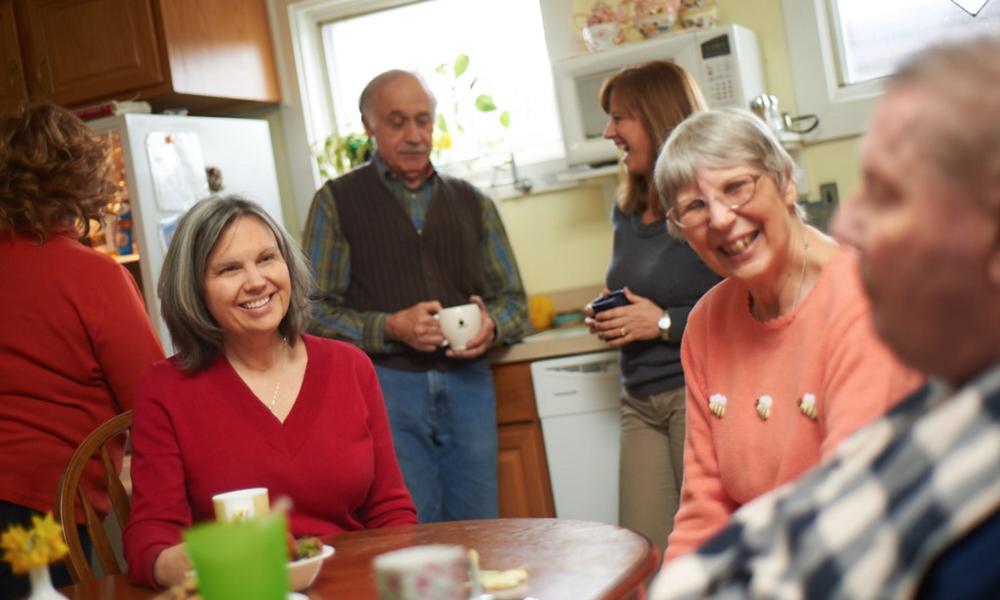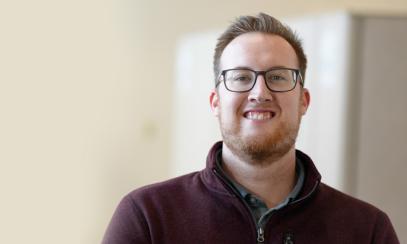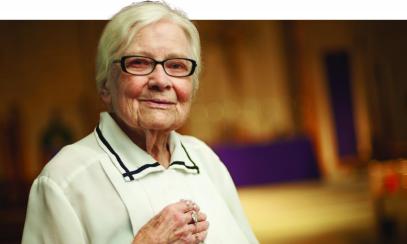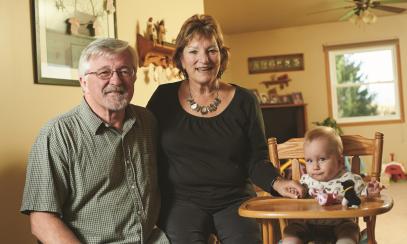
By Their Side at Mother Teresa House
Karen Bussey finds in the midst of dying there is precious life.
At Mother Teresa House in Lansing, she, her staff and volunteers love those who are alone at death, regardless of religious affiliation, and help them transcend into eternal life.
“I love to think of this time of life as the culminating point, the summation of your whole life,” says Karen.
The Catholic Church sees dying as a special time where the focus is on future life with God. People worried about taking care of basic needs can’t experience peace and reflection special to this time of life.
“That’s why the Church is there for the poor,” Karen says. “They are in situations that do not support their dignity. The Church especially wants to care for the sick at the end of life. The poor shouldn’t be deprived of the presence of God.”
Karen, with her background in medical social work, felt a call to minister to the dying. “I felt the Lord was asking me to do this. It was only because of prayer that I felt I should do this,” says Karen. “I said to him, ‘You know I don’t know how to do this.’”
With God’s guidance and inspiration from Mother Teresa, Karen began her ministry. The focus of Mother Teresa House is to provide an environment of love for those without family or finances, although guests with caregivers are able to stay, if there is room. Referrals come from area hospices and hospitals.
When hospice workers discover a patient who lives in need or in distress, they call Mother Teresa House. When hospitals have a patient who cannot be released to his or her home without a care-giver, they call Mother Teresa House.
“The hospitals and hospices are serving people in the community and see when there is no one there with a patient,” Karen says. “Sometimes people will call us up themselves. The people without material resources are our priorities. We will take the person who can’t pay.”
Guests of Mother Teresa House are from every ethnic and religious background.
“This home can be a place of peace on many levels,” says Karen. “We respect the person’s conscience and faith. We’ll pray with the person if he or she wants it.”
Mother Teresa House began its ministry in 1997, before there was even a house for guests. Interestingly, this was the same year assisted suicide was on the state ballot.
“This work that we do is an antidote for euthanasia and suicide,” Karen says. “I think it has to continue as long as human dignity is not respected and human life is not respected. Our lives are entrusted to us by the Lord. The sick deserve special respect from us.”
Although physical suffering may be part of the end of life, there is so much more involved for individuals and their families.
“Connected to ‘Thou shalt not kill’ is the idea of peace. There is an order to things,” says Karen.
“It takes courage to live. It takes courage to accept the life the Lord gives to us and rely on him. At Mother Teresa House, I see reconciliation happening instead of strife. I see people reconciling with others, with themselves, with the Lord. Every last minute a person has, has a reason; God is working in those moments.”
Karen believes our culture’s emphasis on independence can often make the end of life more difficult for people. The idea of relying on others for care and assistance is defined as being a burden. Mother Teresa House changes that idea through its ministry of service.
“People discover their worst fears dissolve, life is livable and good. They find that we are here to help each other,” Karen says. “We are not heroic, we simply sit at their side. We are with them. We are sharing it (whatever they are facing) together.”
Although assisted suicide is not a hot button topic of conversation now the way it was in 1997, Karen sees ambivalence toward assisted suicide in some of her medical student volunteers when they first arrive at Mother Teresa House. The students often believe people have the right to choose when and how to die, if quality of life is not what it once was for a person.
“People use words like ‘quality of life’ to make assisted suicide acceptable, sanitized.” says Karen. “There is a dignity to a person’s life even if they are unconscious or can’t walk around … The antithesis to offering suicide is to just be there for the person.”
Volunteering at Mother Teresa House is a tangible way to understand the value of life, and service to the dying is a gift for the living.
“People become surprised by the change that can happen within. It’s a joy to me that they are going to take this experience and have a sense of loving a sick person,” Karen says. “They are encouraged by the sick person, or may find their faith again.”
At its heart, Mother Teresa House is a home. There is room for three guests, and they are treated like family. Special meals, time with family and friends, and care from volunteers make each day peaceful and filled with joy.
“We provide the hour-to-hour care that hospice doesn’t provide. It’s a modest residential house in downtown Lansing. It’s a small operation, but there’s a lot of life in the house. It is pretty full up to the rafters with life,” says Karen. “People bring their best here. The young people bring strength and joy. The older people bring their kindness.”
The joy of Christ and Catholic faith fuel the ministry at Mother Teresa House. Prayer happens every day with a Scripture service at 3 p.m. for those who wish to participate. For those guests who don’t want to participate, staff members pray for them privately.
“Often we have people who have no faith background,” Karen says. “We pray in a way that includes people. They are experiencing the love of the Lord through the people caring for them. Certainly we are a Catholic mission and we are doing it for our love of Christ. We speak through our selfless love. It’s a precious gift to be given this work.”



